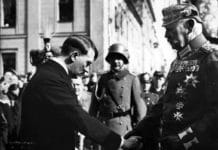![George Habash square [Tulkarem?], Taken on 7 April 2011, Source: https://www.panoramio.com/photo/50717122. Author: Mujaddara. (CC BY-SA 3.0)](https://socbib.dk/wp-content/uploads/2007/05/George_Habash_sq_-_panoramio.jpg)
Socialistisk Biblioteks Tidslinje med links til begivenheder og personer i 1925.
Se også Index over personer, organisationer/partier og værker (som bøger, malerier, mm.), steder, begivenheder, mv., der er omtalt på hele Tidslinjen, titler og indhold på emnelisterne osv.
Bladliste
Nye blade 1925:
- Kampen. Organ for Danmarks Kommunistisk Ungdomsforbund
- Kvindernes Oplysningsblad. Udg af Arbejderkvindernes Oplysningsforbund, se nedenfor 28. april 1925.
- Ny Produktion.Fra Stat til Sogn – Fra Lønarbejde til Samarbejde
- Solidaritet. Organ for den syndikalistiske Arbejderbevægelse i Danmark. Udg. af Revolutionært Arbejderforbund.
- Se: Arbejderhistorisk Bladliste, under året 1925 (scroll ned)
12. februar 1925
Forfatteren Tage Skou-Hansen fødes i Fredericia. (dør 11. november 2015 i Århus). Hovedværk: De nøgne træer, 1957.
Leksikalt:
- Tage Skou-Hansen (Litteratursiden.dk). Med biografi + bibliografi.
- Tage Skou-Hansen (Denstoredanske.dk)
- Tage Skou-Hansen (Dansk Biografisk Leksikon)
Artikler:
I frimodighed og tillid. Af Erik Skyum-Nielsen (Information.dk, 12. november 2015). “Forfatteren Tage Skou-Hansen, der i februar fyldte 90, er død efter længere tids sygdom. Dansk kultur har mistet en årvågen iagttager og kommentator og dansk litteratur en fin samtids- og samfundsskildrer.”
Tage Skou-Hansen er død. Af Hans Hertel (Politiken.dk, 11. november 2015). “Det blev til et af vores store efterkrigsforfatterskaber, der fastholder 70 års Danmarkshistorie, fra 1930’rne via 60’ernes og 70’ernes opbrud til 90’ernes rådvilde bjergsomhed …”
De nøgne træer – Tage Skou-Hansen. Af Søren Schou (Dansk Litteraturs Historie, bd. 4, side 561-564.
Borgerens længsel efter det radikale opgør – Tage Skou-Hansen. Af Søren Schou (Dansk Litteraturs Historie, bd. 5, side 333-344.
Et bragende gennembrud 50 år efter. Af Hans Hertel (Politiken.dk, 3. november 2007). “Tage Skou-Hansens debutroman ’De nøgne træer’ om krig og kærlighed, oplevet på dagen, på stedet, i uniform: 29. oktober 1957 – og 2007.”
En dansk forfatter, der ved noget om sprængstoffer. Af Kristen Bjørnkjær (Information.dk, 1. november 2007)
21. marts – 6. april 1925
Kommunistisk Internationales eksekutivkomite (EKKI) opstiller på sit udvidede 5. plenum i Moskva “bolsjevisering” som hovedparole for sektionernes (kommunistpartiernes) arbejde.
18. marts 1925
Manglende lønforbedringer for lavest lønnede giver et nej til forhandlingsresultatet fra Arbejdsmandsforbundet, der går ud i 80 dages kamp, der ender med accept af mæglingsforslaget, og at forbundet er ude af landsorganisationen DsF i 4 år. Socialdemokratiske regering var klar med lovindgreb.
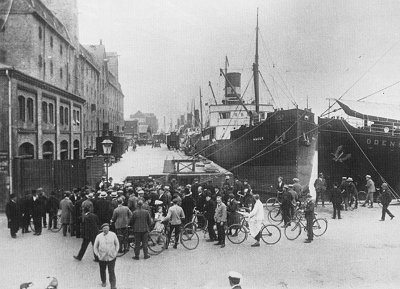
Strejkende arbejdere stimler sammen på Sankt Annæ Plads ved den aflukkede Larsens Plads, under storkonflikten i 1925. Foto: Ukendt. Kilde: ABA
Se:
- Arbejdsløshedsbevægelserne i 1930’erne (Arbejdermuseet; Plads til os alle).
Se også:
- Lyngsie, M.C. (Leksikon.org)
12. marts 1925
Grundlæggeren af den nationalistiske bevægelse i Kina, Yixian, Sun Wen (Sun Yat-sen) dør i Bejing (født 12. november 1866 i Hsiang-shan, Kwangtung Provinsen).
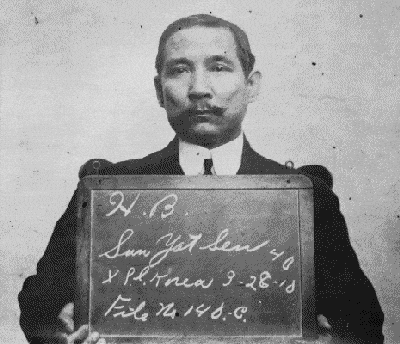
Se:
- Sun Yat-Sen (Leksikon.org).
3. april 1925
Den britiske Labour-politiker Tony Benn fødes i London (dør 14. marts 2014 i London). Han var minister 1964-70 + 1974-79, og han blev ledende talsmand for Labours venstrefløj fra 1970erne.

Links:
- Benn, Tony (Leksikon.org)
- Tony Benn (Wikipedia.org)
Nekrologer/Obituaries etc:
Tony Benn lives. By Richard Burgon (Jacobin, March 17, 2022). “Legendary British socialist Tony Benn passed away eight years ago this week. From democratizing the economy to campaigning for peace, the causes he fought for are as relevant as ever.”
Tony Benn spent his life fighting for democracy and socialism. By Leo Panitch and Colin Leys (Jacobin, April 3, 2020). “We remember his contributions to the struggle for democracy and socialism, a struggle that we must continue today.”
Tony Benn: the moderate extremist (Weekly Worker, Issue 1002, March 20, 2014). “Paul Demarty examines the legacy of a tireless champion of the Labour left.”
Tony Benn 1925-1914. By Sean Matgamna (Workers’ Liberty, 17 March 2014). “An analysis of the strange political career of Tony Benn.”
Tony Benn: a vision to inspire and mobilise. By Phil Hearse (Socialist Resistance, March 15, 2014). “… in celebrating his life the important thing for the left, especially the younger generation, is to make an assessment of Benn and Bennism as a political phenomenon …”
Why I am an unrepentant Bennite (Red Pepper, March 2014). “Mike Marqusee remembers one of the great modern communicators of the socialist cause.”
Tony Benn really was ‘dangerous’ – to the establishment (Red Pepper, March 15, 2014). “Hilary Wainwright looks back at how Tony Benn’s frustrations in government spurred him to spend his life fighting for real democracy.”
Labour’s lost leader (Red Pepper, March 2014). “Leo Panitch assesses the legacy of Tony Benn.”
Veteran Labour “left” Tony Benn dead at 88 (World Socialist Web Site, 15 March 2014). And republishing an longer article from July 7, 1999 by Julie Hyland and Chris Marsden.
Tony Benn (1925–2014). By Ian Birchall (RS21: revolutionary socialism in the 21st century, March 14, 2014). “He was a serious reformist politician – and increasingly, as he grew older, a left reformist. … a genuine socialist who fought to the end.”
Obituary: Tony Benn. By Peter Taaffe (Socialistworld.net, 14 March 2014). “Steadfast in speaking out for socialism.”
Tony Benn: socialist, comrade, friend (Counterfire, 14 March 2014). “An obituary written at the time of Tony Benn’s passing by John Rees on a life well lived.”
Tony Benn: an outstanding leader of the British left. By Rob Sewell (In Defence of Marism, 14 March 2014). “… he became the standard bearer for the left and the militant working class in the 1970s and 1980s.”
Tony Benn 1925-2014: inspiring socialist who moved left through his life. By Charlie Kimber (Socialist Worker, Issue 2394, 14 March 2014). “Tony Benn was one of the most important figures on the socialist left in Britain throughout the last four decades.”
Artikler + anmeldelser/Articles & reviews:
Tony Benn: Will and Testament. By Jeannie Robinson (Socialist Review, October 2014). Review of Skip Kite’s documentary.
The labour of Tony Benn. By Peter Taaffe (Socialism Today, Issue 174, December 2013/January 2014). Review of The Last Diaries of Tony Benn: a blaze of autumn sunshine (Hutchinson, 2013)
Tony Benn on life on the outside (Socialist Review, Issue 317, September 2007). Interview by Lindsey German and Judith Orr.
Life of the struggle. By Solomon Hughes (Socialist Review, Issue 268, November 2002). Review of Tony Benn, Free at Last: Diaries 1991-2001 (Hutchinson, 2002)
Freedom, struggle and constraint. By Chris Harman (Socialist Worker, No.1821, 12 October 2002). Review of Tony Benn, Free At Last: Diaries 1991-2001 (Hutchinson, 2002)
The Labour Left’s brightest star. By Paul Foot (Socialist Review, No.3, March-April 1980). Review of Tony Benn, Arguments for Socialism (Penguin Books, 1980)
- RIP Tony Benn: Tireless and inspirational fighter for peace, justice and equality. By Lindsey German (Counterfire, 14 March 2014)
+ Video: Tony Benn’s last public speech for Stop the War, 30 November 2013 (7:39 min.) - Video: Shows featuring Tony Benn (Democracy Now!, 2004-2014)
- Video: Tony Benn saw socialism as the culmination of democratization (TheRealNews/YouTube, 18/03/14, 14:17 min.). Leo Panitch on the death of Tony Benn.
- Video: Tony Benn in conversation with John Rees – the early Labour Party (Counterfire, 14 March 2014, 9:37 min.). Recorded on 3 February 2013.
- Video: Lessons of the the 1926 General Strike (YouTube, 58 min.). Tony Benn and Duncan Hallas speak at Marxism 1996.
Followed by Question Time: Left wing Politics (YouTube, 5:49 min.). On New Labour, class war etc.
The last of the reformists? A review of Tony Benn’s Diaries 1963–1980. By Donny Gluckstein (International Socialism, Issue 50, Spring 1991, p.105–123; online at Marxists Internet Archive). “[He] was witness to the death of the consensus built around the post-war boom and its replacement by endemic crisis and the collapse of mainstream reformist ideas in the Labour Party.”
Se også debat om venstrereformisme:/See also on Left Reformism:
- Three letters to a Bennite. By Paul Foot (Socialist Workers Party, London, March 1982; online at Marxists Internet Archive)
- Anatomy of the Bennite Left. By Jonathan Bearman (International Socialism, Issue 6, Autumn 1979, p.51–70; online at Marxists Internet Archive)
- Britain’s crisis and the road to internationalsocialism: a reply to Jonathan Bearman. By Geoff Hodgson (International Socialism, Issue 7, Winter 1980, p.82–94)
- The Alternative Economic Strategy. By Bob Rowthorn (International Socialism, Issue 8, Spring 1980, p.85–94)
- Reply to Left Reformism. By Sue Cockerill (International Socialism, Issue 8, Spring 1980, p.95–104)
- Left reformism, the state and the problem of socialist politics today. By Paul Blackledge (International Socialism, Issue 139, Summer 2013, p.25-56)
- Understanding Left Reformism. By John Molyneux (Irish Marxist Review, No.6, June 2013, p.22-35). Dansk udgave: Hvordan skal man forstå venstre-reformismen? (Marxisme Online)
- Socialists and Left Government. By James O’Toole (Irish Marxist Review, Vol.4, No.12, 2015)
24. april 1925
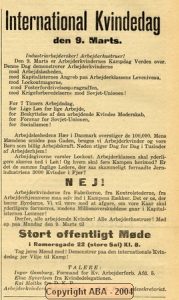
Arbejderkvinders Oplysningsforening, en såkaldt faglig venstreklub stiftes af bl.a. Marie Nielsen og Inger Gamburg (første formand), med opgaver som fagopposition, kampen for ligeløn og seksualoplysning.
Udgav tidsskriftet Kvindernes Oplysningsblad (1925-1937), fra nr. 5, 1929: Arbejderkvindernes …, og fra april 1933: Arbejderkvinden. 6 af de første numre online: se: Kilder til ligelønskampen (Arbejdermuseet).
Se:
Arbejderkvindemes Oplysningsforening 1925-34 (pdf). Af Hanne Caspersen (Årbog for arbejderbevægelsens historie, nr. 8, 1978, side 97-152). Om foreningens faglige arbejde og seksualpolitiske oplysningsarbejde, og om forholdet til DKP og det bredere fagoppositionelle arbejde.
Se også:
Inger Gamburg /1892-1979) (Kvindebiografisk Leksikon)
Se også på Socialistisk Bibliotek:
- Tidslinjen: 23. december 1875, om Marie Nielsen.
- Tidslinjen: august 1925 længere nede på denne side.
- Tidslinjen: 24. september 1955, om lægen og seksualoplyseren læge J.H. Leunbach og seksualreformbevægelsen.
19. maj 1925
Malcolm Little (senere Malcolm X) fødes i Omaha, Nebraska. Skudt ned 21. februar 1965. Se linkboxen: Malcolm X (1925-1965)
25.-30. maj 1925
“30. maj-bevægelsen”: kinesiske arbejders strejke- og demonstrationsbevægelse i storbyerne mod udenlandsk kapital starter den kinesiske revolution 1925-27, (der viste arbejderklassens evne til en ledende rolle i tilbagestående landes koloniale revolution).
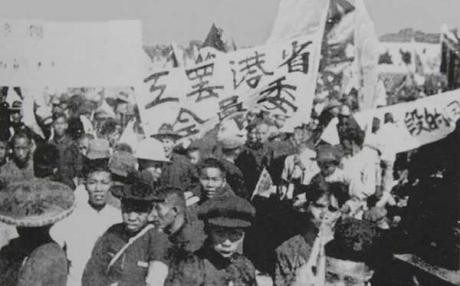
Se:
- Den kinesiske revolutions nederlag 1925-27: en unødvendig tragedie. Af Hans Jørgen Vad (Aktivt Socialistisk Forum, 1991, 23 sider; online på Internet Archive WayBackMachine). Historieopgave ved Århus Universitet.
- The Workers’ Revolution. – i: The Mandate of Heaven. By Nigel Harris (1978, s.3-15)
2. juli 1925
Den afrikanske nationalist og Congos første leder Patrice Lumumba fødes i Onalua (myrdes 17. januar 1961, se denne).
18. juli 1925

Se:
- Mein Kampf (Denstoredanske.dk)
- Mein Kampf + Zweites Buch (Wikipedia.org)
- Brugsanvisning til ’Mein Kampf’. Af Henriette Harris (Information/ Moderne Tider, 31. oktober 2015). “Adolf Hitler løj sig igennem ’Mein Kampf’ … En tysk historiker har netop udgivet, hvad han selv kalder en ’brugsanvisning’ til den.”
- Dansk forlag genoptrykker Hitlers ‘Mein Kampf’. Af Nils Thorsen (Politiken.dk, 23. januar 2015)
- Læs Politikens oprindelige anmeldelse af ‘Mein Kampf’ (Politiken.dk, 22. januar 2015). “I sin anmeldelse fra 1930 gør redaktøren Georg Gretor opmærksom på, at Hitler er en farlig mand.”
- Online version på engelsk: Mein Kampf.
- Review of Mein Kampf by Adolf Hilter. By George Orwell (New English Weekly, 21 March 1940; online at Openculture.com)
- Nationalsocialisme (Leksikon.org)
Se også:
Anmeldelser af Ian Kershaws store Hitler-biografi (1998/2000):
The resistible rise of Adolf Hitler, by Kevin Ovenden (International Socialism, Issue 81, Winter 1998, page 147-154).
A dictator for his time, by Dave Renton (Socialist Review, Issue 225, December 1998; online at Internet Archive)
Just a case of bad intentions? by Alex Callinicos (Socialist Review, Issue 246, November 2000; online at Internet Archive)
Se også på Socialistisk Bibliotek:
- Tidslinjen: 30. januar 1933, hvor Hitler bliver rigskansler i Tyskland.
- Linkboxen: Nazi-Tyskland 1933-45
20. juli 1925
Den algierske befrielsesforfatter og psykiater Frantz Fanon fødes på Martinique (dør 6. december 1961 i Algier).
Se på Socialistisk Bibliotek:
- Personlisten: Frantz Fanon (1925-1961)
August 1925
Det nystiftede Arbejderkvindernes Oplysningsforening, udgiver første nummer af Kvindernes Oplysningsblad. Red. af Marie Nielsen. Sidste nr. i september 1937. Se Hans Uwe Petersen: Kilder til ligestillingskampen (Arbejdermuseet). Med 5 numre af bladet online (1925-1928).
Se:
Nielsen, Marie (Leksikon.org)
Se på Socialistisk Bibliotek:
Tidslinjen 23. december 1875, om Marie Nielsen
29. juli 1925
Den græske komponist og politiker Mikis Theodorakis fødes på øen Chios i det Ægæiske Øhav. Dør 2. september 2021 (se denne dato).
1. august 1925 (2. august 1926?)
George Habash, stifteren af PFLP, Popular Front for the Liberation of Palestine/Folkefronten til Palæstinans Befrielse, og dets generalsekretær 1967-2000, fødes i Lydda, Palæstina (senere: Lodv i Israel). (Dør 26. januar 2008).
Se på Socialistisk Bibliotek:
- Emnelisten: PFLP – “Mod imperialisme, zionisme og arabiske reaktionære” – Afsnittet om George Habash
- Emneoversigten: Palæstina / Israel
3. oktober 1925
Den amerikanske forfatter, kulturkritiker og politiske skribent Gore Vidal fødes i West Point, New York (dør 31. juli 2012 i Hollywood).
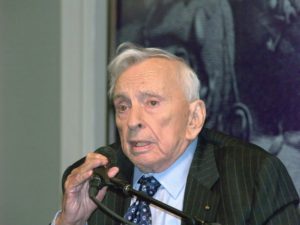
Se:
- Gore Vidal (Wikipedia.org)
- The Gore Vidal Pages (site)
Gore Vidal: The United States of Amnesia. By Fred Mazelis (World Socialist Web Site, 2 June 2014). “The newly released documentary, Gore Vidal: The United States of Amnesia, about the literary figure, public intellectual and political gadfly and radical … has much to recommend it.”
American writer and liberal thinker Gore Vidal, 1925-2012. By Sandy English (World Socialist Web Site, 27 August 2012). “One of the more penetrating bourgeois critics of American politics and culture, he always remained firmly of and within the establishment.”
Gore Vidal: a rebel in the American establishment (Socialist Worker, Issue 2315, 11 August 2012). “Richard Seymour looks back at the life of a literary radical and fierce critic of US empire.” See also the longer edition: Gore Vidal remembered: ‘Every time a friend succeeds, I die a little’ (Al Jazeera, 4 August 2012)
Consciously political: Gore Vidal, 1925-2012. By Mike Belbin (Weekly Worker, Issue 926, August 9, 2012). “Gore Vidal was a consciously political animal, in the broadest sense.”
Uncompromising critic of America’s rulers (SocialistWorker.org, August 9, 2012). “Bill Crane remembers the life of one of U.S. society’s most powerful critics.”
Remembering Gore Vidal. By Jon Wiener (The Nation, August 1, 2012). “Gore was a citizen of the republic and a critic of the empire.”
Gore Vidal died (In Defence of Marxism, 2 August 2012). “We republish the article The decline and fall of the American Empire by Alan Woods to pay tribute to the prominent US writer and intellectual Gore Vidal” + Gore Vidal: a belated obituary by Alan Woods (1 October 2012). “Who was Gore Vidal, and what did he really stand for?”
Video:
- Gore Vidal remembered: 2003 interviewith late iconoclastic writer & longtime critic of U.S. Empire (Democracy Now! August 3, 2012, 7 min.)
- Gore Vidal on the future (YouTube.com, August 5, 2005, 4:41 min.)
The great unmentionable evil at the center of our culture is monotheism. From a barbaric Bronze Age text known as the Old Testament, three anti-human religions have evolved – Judaism, Christianity, and Islam. These are sky-god religions. They are, literally, patriarchal – God is the Omnipotent Father – hence the loathing of women for 2,000 years in those countries afflicted by the sky-god and his earthly male delegates. The sky-god is a jealous god, of course. He requires total obedience from everyone on earth, as he is not just in place for one tribe, but for all creation. Those who would reject him must be converted or killed for their own good.
(Source: The sky-god as origin of evil, GranneBlog)
19. december 1925
Den 14. partikongres (18.-31. december 1925) i SUKP slutter op bag stalinismens ide (formuleret af Stalin i dec. 24) om socialisme i ét land.

Se:
Socialisme i et land (Leksikon.org)
Se på Socialistisk Bibliotek:
Tidslinjen 17. december 1924
21. december 1925
Sergej Eisensteins stumfilm “Panserkrydseren Potemkin” får premiere i Moskva (særforevisning på SUKPs 14. partikongres). Og i 1928 stumfilmen “Oktober: Ti dage der rystede verden”.
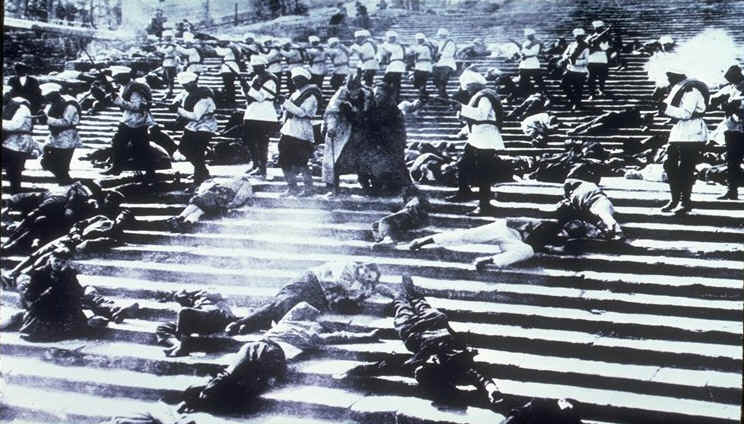
Links:
- The Battleship Potemkin (Wikipedia.org).
Failing Eisenstein: the Pet Shop Boys’ new score for Battleship Potemkin in Trafalgar Square. By Paul Bond (World Socialist Web Site, 23 September 2004). “Sergei Eisenstein’s Battleship Potemkin (1925) remains one of the greatest achievements in cinematic history.”
Battleship Potemkin, Strike, October by Sergei Eisenstein: Appreciation. By Mark Hoskisson (Permanent Revolution, February 2008; online at Internet Archive). “On the free re-release of Sergei Eisentein’s Battleship Potemkin by the Observer, we publish this brief appreciation of Eisenstein’s major films.”
When antiwar sailors took over the ship. By Amanda Maystead (International Socialist Review, Issue 58, March-April 2008). Review of Neal Bascomb, Red Mutiny: Eleven Fateful Days on the Battleship Potemkin (Houghton Mifflin, 2007,
386 p.)
Se også: / see also
- Sergej Michailovitsj Eisenstein (Leksikon.org).
- Sergej Eisenstein (Denstoredanske).
- Sergej Eisenstein (Wikipedia.dk) + Sergei Eisenstein (Wikipedia.org).
- October: Ten Days That Shook the World (Wikipedia.org). See the film online (YouTube.com, 1:42 m.).
Visualizing revolution: Revisiting Sergei Eisenstein. By Geoff Bailey (International Socialist Review, Issue 105, Summer 2017, p.71-92). “Among Marxist writers on film and film theory, Sergei Eisenstein stands alone.”
Eisenstein’s revolution in film. By Paul Rouhan (Counterfire, March 14, 2016). “A new exhibition showcases the great revolutionary filmmaker’s avant-garde films as well as sketches, his designs for the theatre and memorabilia.”
Sergei Eisenstein: Relative and silent genius. By Catriona Grant (Frontline, Issue 11, 2003; online at Internet Archive). “Eisenstein was without doubt one of the best filmmakers of his time: a real revolutionary, an artist, a unique experience.”
In Perspective: Sergei Eisenstein: A review of the special centenary edition of The Eisenstein Collection. By Anna Chen (International Socialism, Issue 79, July 1998, p. 105-120). See the articles illustrated at Anna Chen’s site. “The movies directed by Sergei Eisenstein during the 1920s provided much of the defining imagery of the Russian Revolution.”
Sergei Eisenstein’s October: a monumental work. By Bernd Reinhardt (World Socialist Web Site, 10 March 2012). “A new version of Sergei Eisenstein’s revolutionary classic October was given a special screening as part of this year’s Berlinale.”
Eisenstein and the Russian Revolution [Video, 8:52 min.]. Talk by Alan Woods (In Defence of Marxism, 7 November 2015). Talking at the International Marxist Tendency’s Red October 2015 weekend school, Alan Woods introduces director Sergei Eisenstein’s masterpiece about the Russian Revolution of 1917: “October – Ten Days that Shook the World”.

















